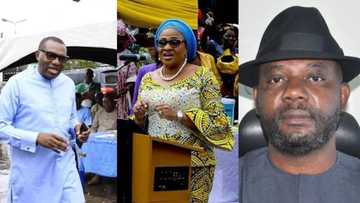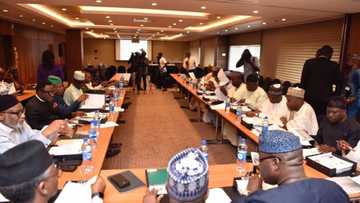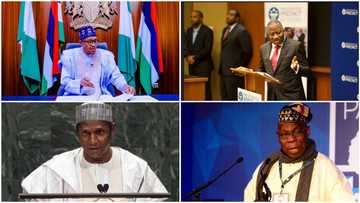Fact-check: Was Dubai Built with $12bn Infrastructure Fund as Claimed by Facebook User?
A Facebook user claimed that Dubai was built with a $12billion infrastructure fund. He also claimed that $2.4 billion was set up by President Buhari as an infrastructure fund in Nigeria.
PAY ATTENTION: Click “See First” under the “Following” tab to see Legit.ng News on your Facebook News Feed!
Verdict:
There is no financial record showing that Dubai was built with a $12billion infrastructure fund. Besides, the infrastructure fund set up by President Buhari in 2021 is $2.6 billion, not $2.4 billion.
Full story:
A Nigerian social media user, Abdullahi Ayofe Olaniyi, in a Facebook post dated Wednesday, September 15, claimed that Dubai, a popular city in the United Arab Emirates (UAE), was built with a $12bn infrastructure fund in 2001.
Olaniyi, whose bio identifies him as “Electrical Engineer, Media Consultant, Advocate of Governance” also describes himself as “Unrepentant Buharist & Tinubuist.”
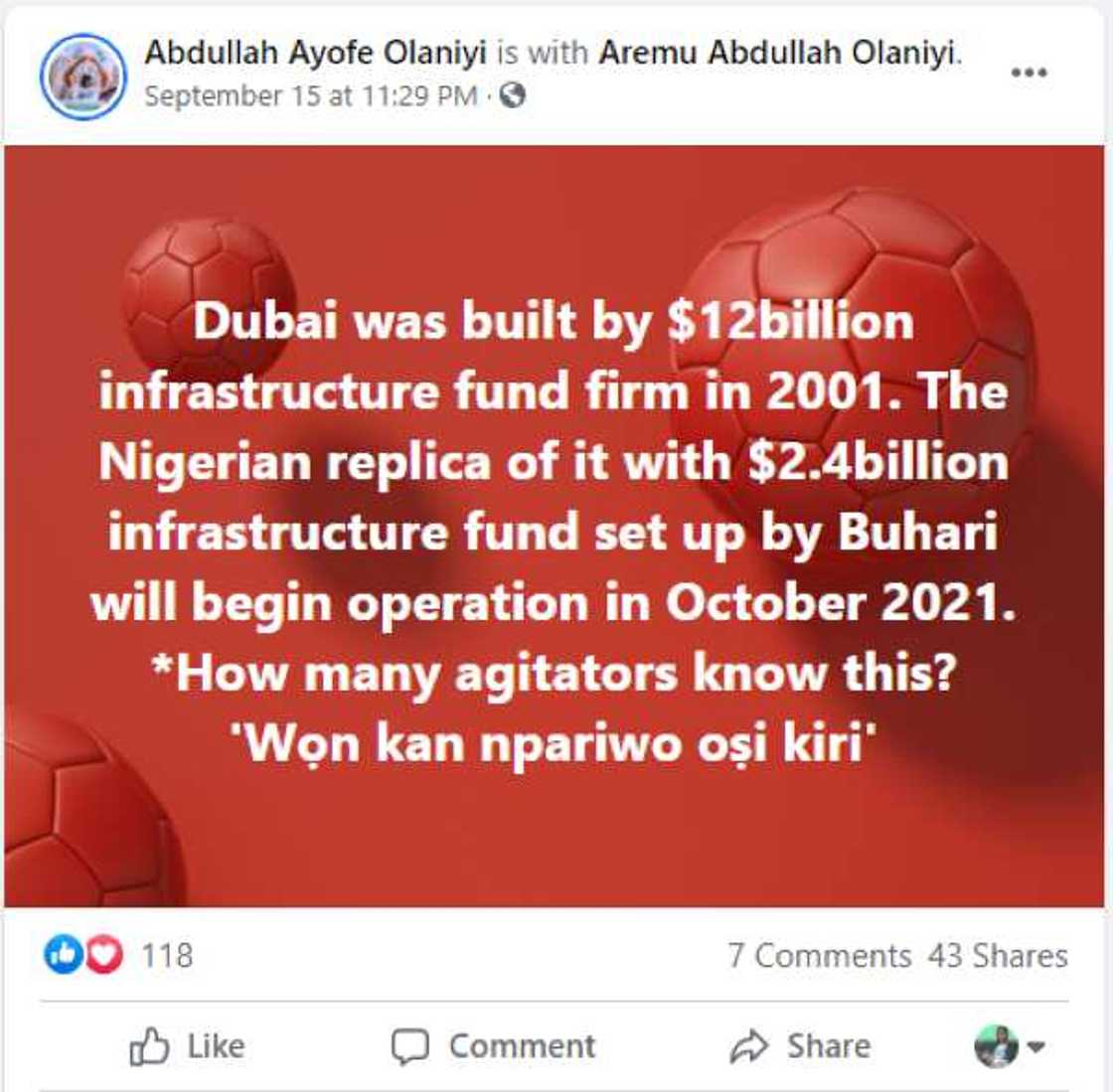
Source: Facebook
PAY ATTENTION: Install our latest app for Android, read best news on Nigeria’s #1 news app
Buharist and Tinubuist are terms used to describe loyalists to the political ideology of President Muhammadu Buhari and former Lagos governor, Bola Tinubu, who also is the All Progressives Congress (APC) national leader.
“Dubai was built by $12billion infrastructure fund firm in 2001. The Nigerian replica of it with $2.4billion infrastructure fund set up by Buhari will begin operation in October 2021.
“How many agitators know this? 'Wọn kan npariwo oṣi kiri (they are just making noises),” he wrote.
Olaniyi’s comment and claim came amid a whirlpool of reactions trailing President Muhammadu Buhari’s fresh request for fresh $4 billion and €710 million external loans.
Fresh $4 billion loan and Nigeria's debt profile under APC/President Buhari-led govt
In a letter directed to the National Assembly (NASS) on Tuesday, September 14, President Muhammadu Buhari sought the country’s lawmaker assent to another loan fund of $4,054,476,863 billion and €710 million (approximately N2.2trillion) from bilateral and multilateral organisations to fund the deficit in the 2021 budget.
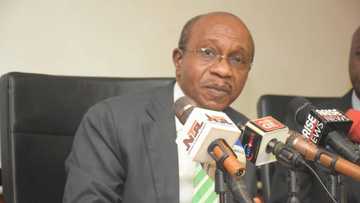
Read also
CBN governor Emefiele to resign after joining APC presidential race? Here’s what CBN Act says
The letter, which was originally dated August 24, was read by the Senate leader president who is by law the 9th NASS chairman, Senator Ahmed Lawan during a plenary.
While asking the lawmakers to approve grant components of $125 million, President Buhari said in the letter that the loan request is an addendum to the 2018-2020 borrowing plan.
"Projects listed in the addendum to the 2018-2021 Federal Government External Borrowing Plan, are to be financed through sovereign loans from the World Bank, French Development Agency (AFD), China-Exim Bank, International Fund For Agriculture Development (IFAD), Credit Suisse Group and Standard Chartered/China Export and Credit (SINOSURE) in the total sum of USD4,054,476,863.00 plus Euro 710, 000,000.00 grant component of USD 125,000,000.00,” part of the letter read.
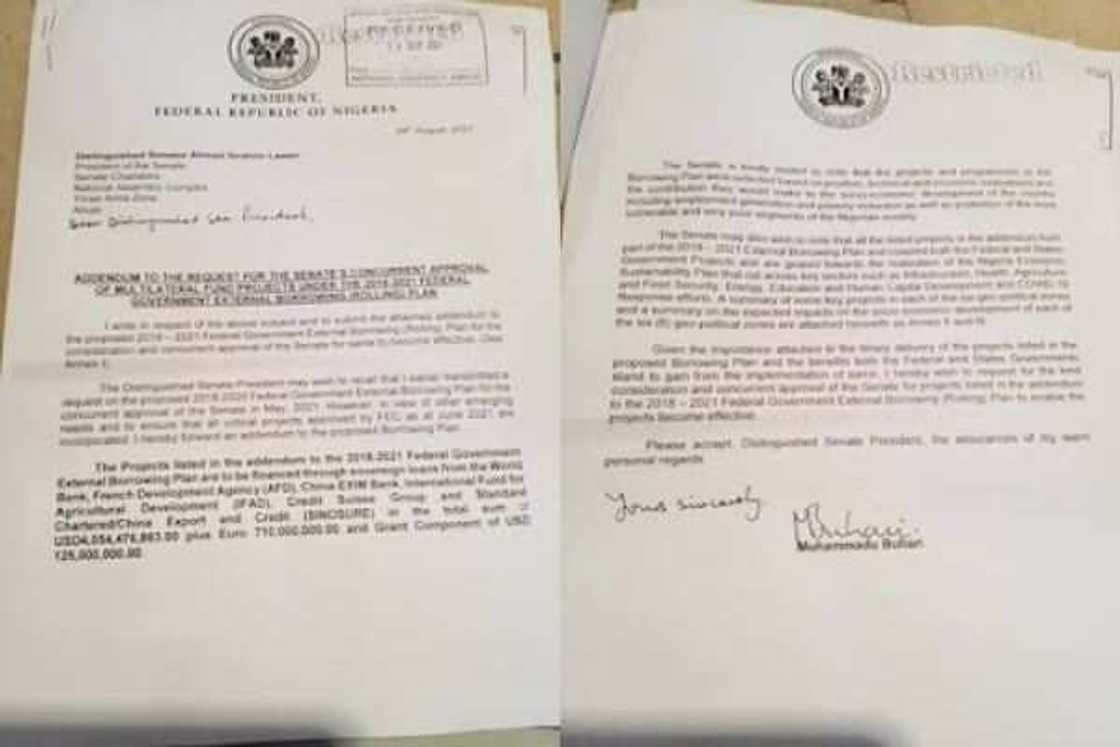
Source: UGC
Not the first time
Apparently, this is not the first time the current APC-Buhari-led federal government would seek a loan either to finance the infrastructure or support the budget.
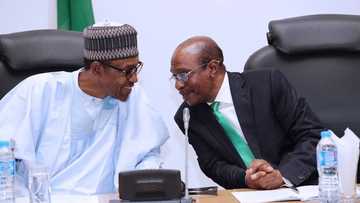
Read also
Nigeria's Excess Crude Account depletes to $35m, as CBN withdraws $384m in 2wks from external reserve
In May 2021, the president requested a N2.343 trillion loan ($6.1 billion). According to him, the loan was meant to part-finance the budget deficit of N5.602 trillion in the 2021 budget.
The loan was eventually approved in July 2021 by the Senate, the upper legislative chamber, despite outcry from concerned Nigerians.
Prior to that, specifically in April 2021, the NASS approved loan requests of $1.5billion and €995million for the Buhari administration.
This came months after the loan request was made to enable the administration to finance the 2020 budget deficit, ‘critical projects.’
A check on Nigeria’s debt figure
Legit.ng’s check into the Debt Management Office (DMO) revealed that as of March 31, 2021, Nigeria has accrued a staggering debt figure of N33 trillion ($87 billion).
In its 2019 ANNUAL NATIONAL DEBT SUSTAINABILITY ANALYSIS (DSA) published on Thursday, September 16, DMO claimed that the “external debt remains at a moderate risk of debt distress.”
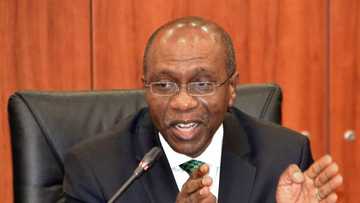
Read also
CBN Governor Godwin Emefiele joins presidential race, pays N100m for APC forms to compete with Tinubu, others
According to the federal agency, this is because “all the debt burden indicators, both the solvency and liquidity, remain below their respective thresholds throughout the projection period.”
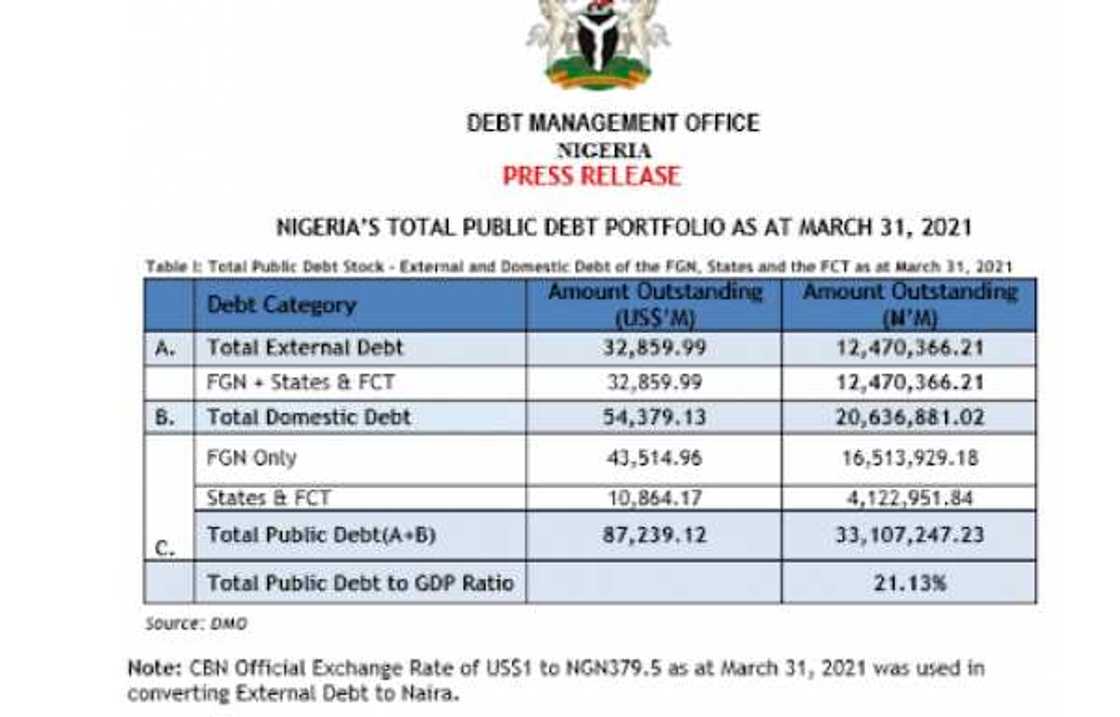
Source: UGC
While DMO’s position appears to lessen the gravity of Nigeria’s expanding external debt profile, finance and economy experts, NGOs including Socio-Economic Rights and Accountability Project (SERAP) and concerned Nigerians have been expressing strong worries over the country’s dangerous loan trend.
A look into Dubai’s history and evolution into tourist city
Founded in 1833 by approximately 800 settlers from the Bani Yas tribe, Dubai which is situated on the Persian Gulf coast of the United Arab Emirates is the biggest city in the UAE and the capital of the Dubai Emirates.
The city is known for luxury shopping, cherished tourist destinations, ultramodern architecture and a lively nightlife scene. Since the 20th century, it has served as a centre for regional and international trade.
World Population Review reported that Dubai has a population of 2,921,376 and is UAE’s second largest by land area, measuring 4,114 square kilometres, and coming second only to Abu Dhabi, the capital of UAE.
However, the population of Dubai is estimated to be 3,411,200 according to the 2020 population data released by the city’s government, a constitutional monarchy overseen by its ruler, His Highness Sheikh Mohammed bin Rashid Al Maktoum.
With a GDP worth of USD$102.67 billion, Dubai's economy relies on revenues from trade, tourism, aviation, real estate, and financial services.
One of the jaw-dropping works of architecture in the city is the Burj Khalifa skyscraper, the tallest building in the world according to the Guinness World Records which has a total height of 829.8 m (2,722 ft, just over half a mile) and a roof height (excluding antenna but including a 244 m spire) of 828 m (2,717 ft).
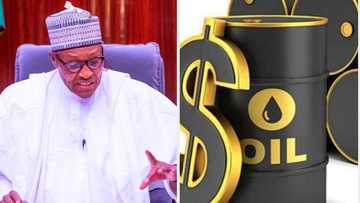
Read also
Nigeria's excess crude account drops again now left with $35m, presidency defend the withdrawals since 2015
In 2021, Dubai was ranked the 5th safest city in the world by NUMBEO, a crowd-sourced global database of reported consumer prices, perceived crime rates, quality of health care, among other statistics.
Verification
Claim 1: Does President Buhari set up $2.4 billion infrastructure funds?
Legit.ng’s findings established that on May 17, 2018, President Muhammadu Buhari approved the establishment of a Presidential Infrastructure Development Fund (PIDF).
According to the information released by the FG, the process is to be managed by the Nigeria Sovereign Investment Authority (NSIA) and invested specifically in critical road and power projects across the country.
During the National Economic Council (NEC) meeting, the president also authorised the initial transfer of $650 million dollars to the NSIA from the Nigeria Liquefied Natural Gas (NLNG) Dividend Account.
Further findings also revealed that on February 12, 2021, President Buhari also approved the establishment of a Public-Private Partnership styled Infrastructure company named Infra-Co with an initial seed capital of N1 trillion.

Read also
Bobrisky, BBN Maria and 9 others slay in gorgeous outfits at Mercy Eke’s 28th birthday party
This came barely four months after the federal government announced it was planning to float N15trillion ($2.6billion) infrastructural funds.
“Infra-Co will finance public asset development, rehabilitation and reconstruction as well as invest in cutting edge infrastructure projects for roads, rail, power and other key sectors,” President Muhammadu Buhari’s office said in a statement.
Meanwhile, contrary to the $2.4 billion figure made in the claim made, the infrastructure fund set by President Buhari is $2.6 billion.
Claim 2: Was Dubai built with a $12billion infrastructure fund in 2021?
Verifying the claim made by the social media user, Dubawa ran a Google search with the SEO anchor words “$12 billion infrastructure funds Dubai.”
A multiple-link response provided by the search engine in relation to “$12 billion infrastructure funds” showed an article published on June 9, 2006, by Arab newspaper Khaleej Times with the headline “Emirates to raise $12b funds.”

Read also
Bobrisky rains cash on Mercy Eke at talk-of-town 28th birthday despite being called out for owing millions
Details from the reports, however, indicated that the $12 billion was to be raised for six years for the airline's aircraft acquisitions.
A related report was contained in the Saudi Gazette of April 13, 2014, which projected that Foreign Direct Investment (FDI) investment in UAE “reaches” $12b and was projected to cross $14.4 billion.
In respect to the year mentioned in the claim--2001, findings by Dubawa showed that truly in the 2000s, Dubai began to witness a sudden change in its economic and infrastructural plan-- but not specifically in 2001.
For instance in 2002, Dubai, as part of its development plan which was channelled towards tourism and real estate development, allowed foreigners to own real estate.
The city, as a result of the new development, was announced by a global real estate consulting firm Jones Lang LaSalle as one of its “World Winning City,” a research program aimed at identifying the future’s most attractive property markets.
This signposted a shift in the development of the city. Between 2004 and 2006, the Dubai government’s decision to diversify from a trade-based, oil-reliant economy to one that is service- and tourism-oriented has been massively paying off.
Although there were challenges like the Great Recession which heavily affected property value, and led to Dubai's foreign debt hitting $80 billion in February 2009. The bold move led to the construction of great buildings including Emirates Towers, the Burj Khalifa, the Palm Islands and the most expensive hotel in the city, the Burj Al Arab.
By 2015, there was a 12.5% increase in terms of new companies being registered in Dubai. As at the first quarter of the year, the growth has brought the total number of registered companies to 106,000 firms.
Dubai’s debt record
A look into Dubai’s debt record showed that the worst moment in terms of the debt profile of Dubai was in November 2009 when the city’s foreign debt hit $80 billion which was occasioned by recession and a fall in property value.
This came after a “historically long economic high-growth” period in the real estate sector of the country.
Upon all this, there is no record that in 2001, the city was built with or by a $12bn infrastructure fund.
Conclusion
Although Dubai’s economic transition which is reflected in its current growth took a flight in the 2000s, there is no record showing that the city was developed by/with $12 billion infrastructure funds.
Besides, the infrastructure fund set by President Buhari is $2.6 billion, not $2.4 billion.
Source: Legit.ng


